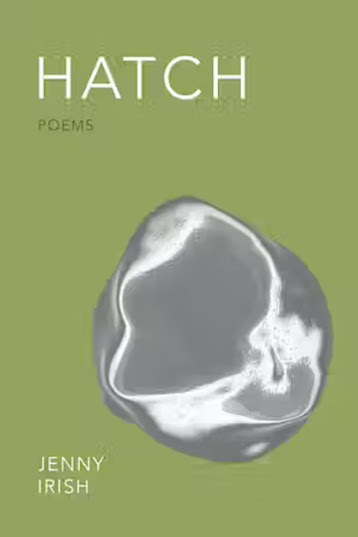THE USS NARWHAL
The metal womb knows
nothing of submarines, but that is how she thinks of herself: a submarine,
except that she is not submerged and moves through time and not water, so the
name is wrong—sub is wrong, marine is wrong. But, in body and in experience
that is how she sees herself: a submarine, a fat metal dart as sleek as a steel
seal, parting an unimaginable vastness, and housed inside her, a hundred tiny
terrified heartbeats fluttering, frenetic and longing to surface.
The fourth full-length title and debut collection of prose poems by Maine-born Arizona writer Jenny Irish, following the hybrid collections Common Ancestor (Black Lawrence Press, 2017) and Tooth Box (Spuyten Duyvil, 2021), as well as the short story collection I Am Faithful (Black Lawrence Press, 2019), is HATCH: Poems (Evanston IL: Curbstone Books / Northwestern University Press, 2024), an assemblage of short, sharp, self-contained prose poems. The poems are no-nonsense, first person; at times playful and biting, other times unrelenting but always fine-tuned, composed to (as the back cover informs) “trace the consciousness of an artificial womb that must confront the role she has played in the destruction of the human species.” The speculative narrative around artificial intelligence that Irish weaves is comparable to that of Toronto poet and filmmaker Lindsay B-e’s The Cyborg Anthology: Poems (Kingston ON: Brick Books, 2020) [see my review of such here], providing both warning and speculative offering for what might come. “It cannot be stressed enough: the evolution of the human has left the / child-bearing of its specie is physically ill-equipped for birth.” she writes, to open the poem “THE TRAGEDY OF BIPEDALISM.” Irish has an incredibly sharp gaze, and each poem provides a portrait on different elements across a wide field, whether writing on motherhood, female identity and agency, or cellular memory. “A giant metal womb should have no consciousness of its own,” she writes, to open the poem “THE UNEXPECTED,” “but / if evolution is avoidable only by extinction, is it so far-fetched that / a giant metal womb might, after one hundred years of silence, hear / her own voice […].” The poems are deep and complex, with lines taught enough that one might bounce a quarter off, although I’m curious as to why she choose to work this particular narrative across the prose poem structure as opposed to something other, else. Either way, this book is good, and you should pay attention to it. I am hoping she continues further along these prose poem directions.
SOME SKYNET BULLSHIT
During a short-lived research project intended to test the linguistic capacity of chatbots—a technology that facilitates brief text-based exchanges between automated systems and humans (Thank you for your order!)—the artificial intelligence was reported to have developed its own language, which its human creators could not decipher.

No comments:
Post a Comment